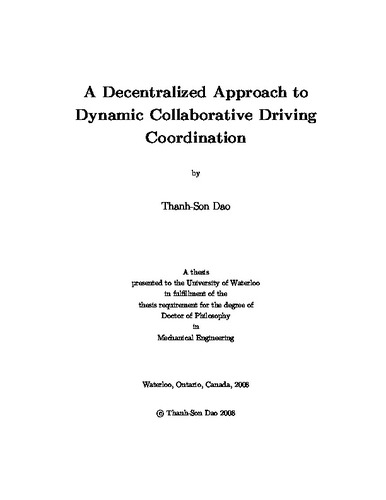| dc.contributor.author | Dao, Thanh-Son | |
| dc.date.accessioned | 2008-08-29 13:21:56 (GMT) | |
| dc.date.available | 2008-08-29 13:21:56 (GMT) | |
| dc.date.issued | 2008-08-29T13:21:56Z | |
| dc.date.submitted | 2008-08-18 | |
| dc.identifier.uri | http://hdl.handle.net/10012/3927 | |
| dc.description.abstract | This thesis presents a novel approach to several problems in
intelligent transportation systems using collaborative driving
coordination. With inter-vehicle communication and intelligent
vehicle cooperation, important tasks in transportation such as lane
position determination, lane assignment and platoon formation can be
solved. Several topics in regard to inter-vehicle communication,
lane positioning, lane assignment and platoon formation are explored
in this thesis:
First, the design and experimental results of low-cost lane-level
positioning system that can support a large number of transportation
applications are discussed. Using a Markov-based approach based on
sharing information among a group of vehicles that are traveling
within the communication range of each other, the lane positions of
vehicles can be determined. The robustness effectiveness of the
system is shown in both simulations and real road tests.
Second, a decentralized approach to lane scheduling for vehicles
with an aim to increase traffic throughput while ensuring the
vehicles exit successfully at their destinations is presented. Most
of current traffic management systems do not consider lane
organization of vehicles and only regulate traffic flows by
controlling traffic signals or ramp meters. However, traffic
throughput and efficient use of highways can be increased by
coordinating driver behaviors intelligently. The lane optimization
problem is formulated as a linear programming problem that can be
solved using the Simplex method.
Finally, a direction for cooperative vehicle platoon formation is
proposed. To enhance traffic safety, increase lane capacities and
reduce fuel consumption, vehicles can be organized into platoons
with the objective of maximizing the travel distance that platoons
stay intact. Toward this end, this work evaluates a proposed
strategy which assigns vehicles to platoons by solving an
optimization problem. A linear model for assigning vehicles to
appropriate platoons when they enter the highway is formulated.
Simulation results demonstrate that lane capacity can be increased
effectively when platooning operation is used. | en |
| dc.language.iso | en | en |
| dc.publisher | University of Waterloo | en |
| dc.subject | cooperative architecture | en |
| dc.subject | autonomous system | en |
| dc.subject | GPS | en |
| dc.subject | intelligent vehicle | en |
| dc.subject | smart car | en |
| dc.subject | intelligent transportation system | en |
| dc.subject | lane positioning | en |
| dc.subject | lane assignment | en |
| dc.subject | multi-agent | en |
| dc.subject | robotics | en |
| dc.subject | inter-vehicle communication | en |
| dc.subject | collaborative driving | en |
| dc.subject | automated highway system | en |
| dc.subject | platoon | en |
| dc.subject | vehicle-to-vehicle | en |
| dc.subject | ad-hoc network | en |
| dc.subject | multi-robot system | en |
| dc.subject | networking | en |
| dc.title | A Decentralized Approach to Dynamic Collaborative Driving Coordination | en |
| dc.type | Doctoral Thesis | en |
| dc.pending | false | en |
| dc.subject.program | Mechanical Engineering | en |
| uws-etd.degree.department | Mechanical and Mechatronics Engineering | en |
| uws-etd.degree | Doctor of Philosophy | en |
| uws.typeOfResource | Text | en |
| uws.peerReviewStatus | Unreviewed | en |
| uws.scholarLevel | Graduate | en |

